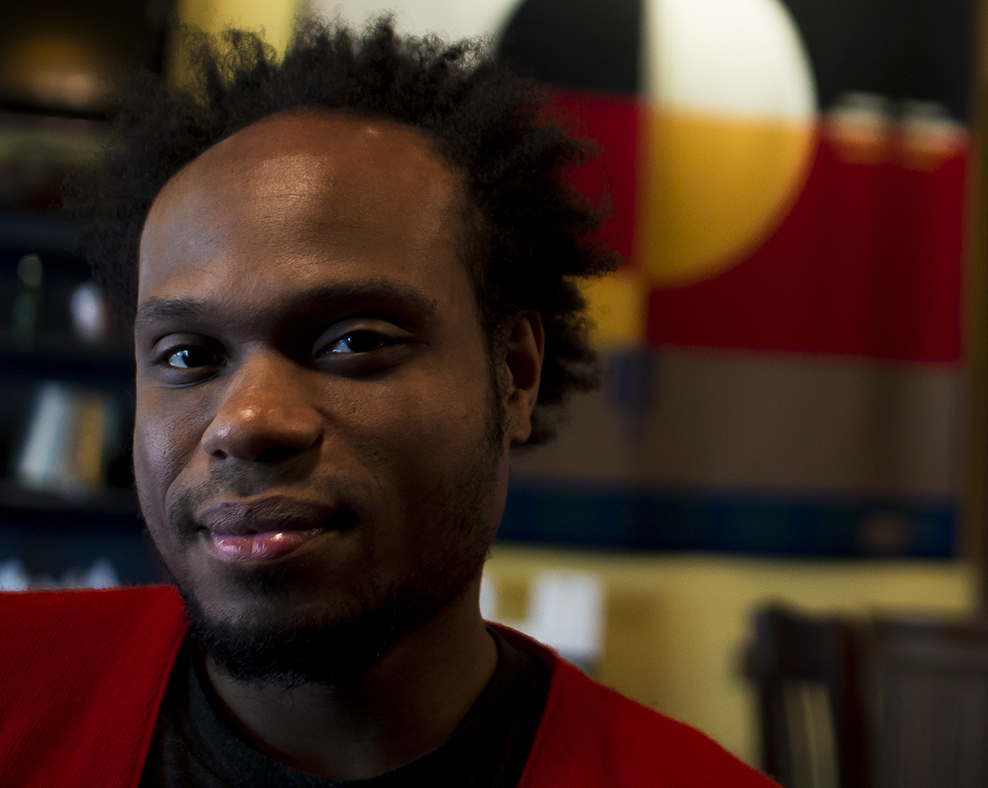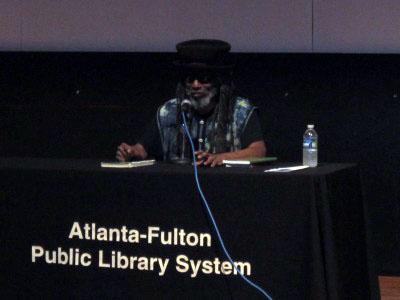P&W-funded Jamaal May is a poet from Detroit, MI, where he taught poetry in public schools and worked as a freelance audio engineer and touring performer. His poetry won the 2013 Indiana Review Prize and appears in journals such as Poetry, Ploughshares, and The Believer. Jamaal has earned an MFA from Warren Wilson and fellowships from Cave Canem and Bucknell University. His first book is Hum (Alice James Books, 2013), and he is founder of the Organic Weapon Arts Chapbook Press.
 Writers frequently ask me how to get more readings. I’ve said for years I don’t know why people give me money and sit still to hear me recite poems. But now that this bizarre phenomenon has occurred more than 600 times in the last nine years (three funded by P&W), I have to admit I do know why I get so many readings, and only part of it is luck. The truth is people like to hear me read. So the better question to ask is “How can I give better readings of my work?” Below are my top five tips.
Writers frequently ask me how to get more readings. I’ve said for years I don’t know why people give me money and sit still to hear me recite poems. But now that this bizarre phenomenon has occurred more than 600 times in the last nine years (three funded by P&W), I have to admit I do know why I get so many readings, and only part of it is luck. The truth is people like to hear me read. So the better question to ask is “How can I give better readings of my work?” Below are my top five tips.
Use Your Everyday Inflection
It’s remarkable to watch a poet charismatically engage an audience with banter then slip into a monotone drone when the poem starts. I suspect part of the reason for the “monotone drone” or the equally disheartening “poet voice” is a fear of performing. Writers tell me they don’t want to perform or be seen as performative. I would argue that an overly dry, disengaged reading is in fact a performance. No one speaks that way. Conversely, our daily conversations are full of varied inflection and shifts in tone. Rather than try to perform a poem, practice reading it in your own voice as if you’re telling those lines to a friend.
Focus on the Words
Another pitfall is the inherent distraction of facing an audience. I’ve found it helpful to shift my thinking to the why behind each poem. Every word in your poem was chosen for a specific reason. Read them as if they have a place in the world. Did an image delight you enough to write it down? Don’t fight back your delight. Did it haunt you? Take your time and let us feel the specter. If we think deeply about every line read, we are less likely to fret over the presence of an audience. Engage the work and engagement with the crowd will follow.
Try to Memorize Your Poems
The emphasis here is on “try.” Many believe they will never have a good enough memory to recite poems by heart. Even if this is true, you should try anyway. It will make you more familiar with the poems, you’ll make eye contact more frequently, and read with more confidence. At the very least you’ll know that line you have to nail is coming up. You will nail it.
Be Nervous
We know from elementary science that energy can’t be destroyed, only changed. Nervousness is a kind of energy so apply this concept to it. I’m still nervous before every reading and I don’t try to stop it anymore. Nervousness means you care. Take it as a sign that you are present and paying attention, then turn that energy and focus towards your poems. Apathy is a much worse state of mind to approach a reading with. The only one worse than that is feigned apathy.
Risk Yourself
When we see a good poetry reading, we are witnessing a writer becoming open enough to get in touch with what they’ve written, the same openness they’ve implicitly asked of the audience. It takes a risk to stand in front of people as if you have something of value to share. Let that come through and be as uncool and awkward as you need to be to get it done. The writing deserves it.
Photo: Jamaal May. Credit: Tarfia Faizullah.
Support for Readings/Workshops events in Detroit is provided by an endowment established with generous contribution from the Poets & Writers Board of Directors, and others. Additional support comes from the Friends of Poets & Writers.





 Writers frequently ask me how to get more readings. I’ve said for years I don’t know why people give me money and sit still to hear me recite poems. But now that this bizarre phenomenon has occurred more than 600 times in the last nine years (
Writers frequently ask me how to get more readings. I’ve said for years I don’t know why people give me money and sit still to hear me recite poems. But now that this bizarre phenomenon has occurred more than 600 times in the last nine years (